How to Avoid the Weakness Mistake That Sinks Most Interviews
The Question That Can Make or Break Your Interview

You’re in the middle of an interview, answering questions smoothly, feeling confident. Then suddenly—boom—you hear the one question that makes your heart race:
❝What are your weaknesses?❞
Your mind goes blank.
Say the wrong thing, and you risk losing the job.
Say something too generic, and you sound unoriginal.
So, how do you nail this tricky question while staying authentic, confident, and professional?
Let’s break it down, step by step.
👉 Struggling to answer the “weakness” question? Don’t worry! This infographic gives you a structured way to approach it—check it out before we go into the details.
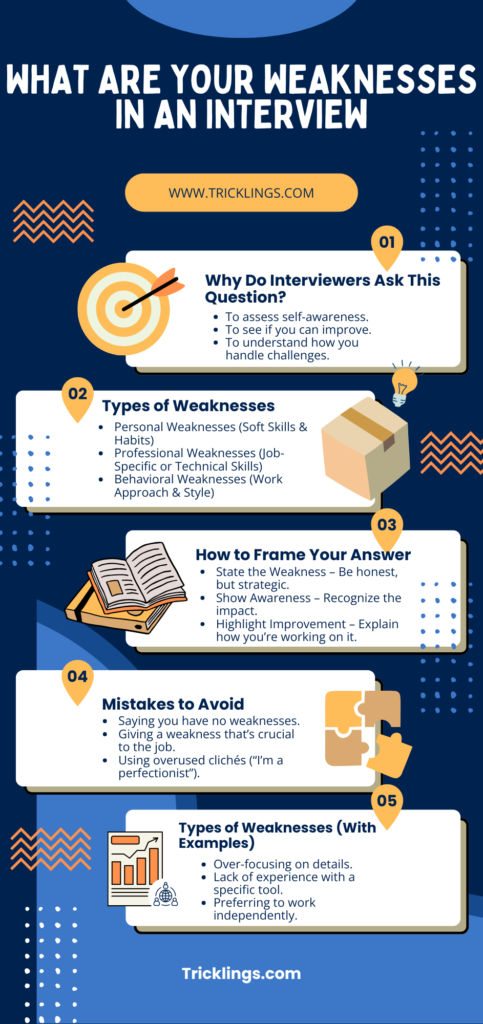
Why Do Interviewers Ask About Weaknesses?
Many job seekers assume the worst—that interviewers want to trap them. That’s not true.
Hiring managers aren’t looking for perfection—they want to see:
✅ Self-awareness – Do you know where you can improve?
✅ Growth mindset – Are you willing to work on yourself?
✅ Resilience – How do you handle challenges?
It’s not about exposing your flaws. It’s about showing that you’re adaptable, self-aware, and committed to getting better.
What Weaknesses Should You Mention? (And How to Frame Them Like a Pro)
Not all weaknesses hit the same. Some raise red flags. Others—when framed right—can show growth, maturity, and emotional intelligence. The trick? Choose one that’s honest but fixable. And always pair it with your game plan for improvement.
Personal Weaknesses (Soft Skills & Habits)
These are traits like nervousness, overcommitment, or trouble saying “no.” They might not derail your job performance, but they do shape how you work.
Example: “I used to struggle with public speaking, but I joined Toastmasters to improve my confidence.”
Why this lands well: It tells the employer you don’t shy away from discomfort—you actively step into it to grow. That’s the kind of mindset teams thrive on.
Professional Weaknesses (Job-Specific or Technical Skills)
These are gaps in your experience or tools you’re still mastering. The key? Be honest, show initiative, and never frame a weakness that’s critical to the role.
Example: “I’m not as experienced with [specific software], but I’ve been taking online courses to build my skills.”
Instead of pretending you know everything, you show you’re a self-starter. Employers don’t expect perfection—they value people who take the wheel and upskill fast.
Behavioral Weaknesses (Work Approach & Style)
These are the patterns in how you think, work, or communicate. Maybe you overanalyze things. Maybe you’re too direct in feedback. These habits don’t make you unqualified—but if unmanaged, they can slow you down or create friction.
Example: “I sometimes overthink tasks, but I’ve learned to set time limits to stay efficient.”
It tells the interviewer you’ve noticed your blind spot—and you’re not ignoring it. You’ve found a system to stay on track. That kind of self-checking behavior is rare and respected.
Want ready-to-use examples?
Check out our list of smart weakness answers most candidates overlook — and learn how to say them with confidence.
The Secret to Answering Honestly—Without Hurting Your Chances
Honesty is powerful—but only when it’s paired with self-awareness and action. You don’t need to confess your deepest flaw. Instead, show that you’re reflective, responsible, and growing. Here’s how to keep your answer honest without sabotaging yourself:
❌ Avoid absolutes. Saying, “I’m terrible at time management,” sounds like a fixed trait.
✅ Instead, say: “I’ve been working on time management by setting daily priorities and using scheduling tools to stay on track.”
❌ Don’t stop at admitting.
✅ Show that you’ve taken steps to improve. Growth matters more than the flaw itself.
❌ Never pick a dealbreaker.
✅ If your weakness makes the hiring manager question your ability to do the job—you’ve chosen the wrong one.
Weaknesses You Should NEVER Mention!
Yes—honesty is key, but don’t confuse it with self-sabotage. Some answers make hiring managers flinch or silently cross you off their list. Avoid these like landmines:
- ❌ Lack of work ethic – Saying “I struggle with motivation” tells them you might not show up—mentally or physically.
- ❌ Poor teamwork – “I don’t work well with others” raises red flags, even for solo roles.
- ❌ Unreliable behavior – Admitting “I often miss deadlines” implies poor planning or disorganization.
- ❌ Critical skill gaps – Don’t say you’re bad at something central to the job, like “I’m terrible with numbers” for a data role.
💡 Pro tip: Choose a weakness that’s genuine—but won’t hurt your credibility. Then show how you’re already working to fix it.
How to Align Your Weakness With the Job
This is where most candidates slip. They pick a real weakness—but one that contradicts the job’s core needs. That’s like applying to be a chef and saying you hate cooking.
- 👉 If the job involves constant collaboration, don’t say you dislike working in teams.
- 👉 If creativity is crucial, avoid admitting you struggle with new ideas.
Choose a weakness that’s real but not a dealbreaker—and make sure it shows growth.
Example:
“Early in my career, I struggled with delegating. I felt more comfortable doing everything myself. But I’ve learned that trust and communication are critical. I now focus on setting clear expectations and giving teammates space to deliver.”
You’ve admitted a real flaw—but paired it with maturity, learning, and leadership.
Common Mistakes That Will Ruin Your Answer
- Using Clichés – “I’m a perfectionist.” (Overused & lazy.)
- Saying “I have no weaknesses” – This makes you sound dishonest or arrogant.
- Oversharing – Personal weaknesses that have nothing to do with work aren’t relevant.
- Choosing a Critical Weakness – If it’s essential to the job, don’t mention it!
The Perfect Weakness Answer Formula
Here’s the winning structure to craft a flawless answer:
- 1️⃣ State the weakness honestly. (Be real, but strategic.)
- 2️⃣ Explain how you recognized it. (Show self-awareness.)
- 3️⃣ Show what steps you took to improve. (Prove you’re working on it.)
✅ Example:
“I used to focus too much on small details, which sometimes slowed down my workflow. To fix this, I started setting time limits for tasks and prioritizing based on impact. Now, I maintain high-quality work without overanalyzing every detail.”
🎯 Why it works:
- ✔ It admits a real weakness
- ✔ It shows growth and initiative
- ✔ It proves you’re a problem solver
Own Your Weakness & Impress Your Interviewer!
Now you know the secret—your weaknesses don’t have to hold you back! Instead, they can be a powerful tool to show your self-awareness, growth mindset, and determination.
👉 Want to be fully prepared? Save this guide & practice your response before your next big interview!
Now go in there and ACE THAT INTERVIEW!





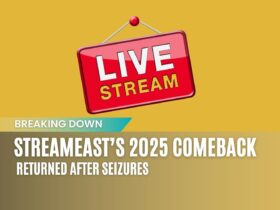
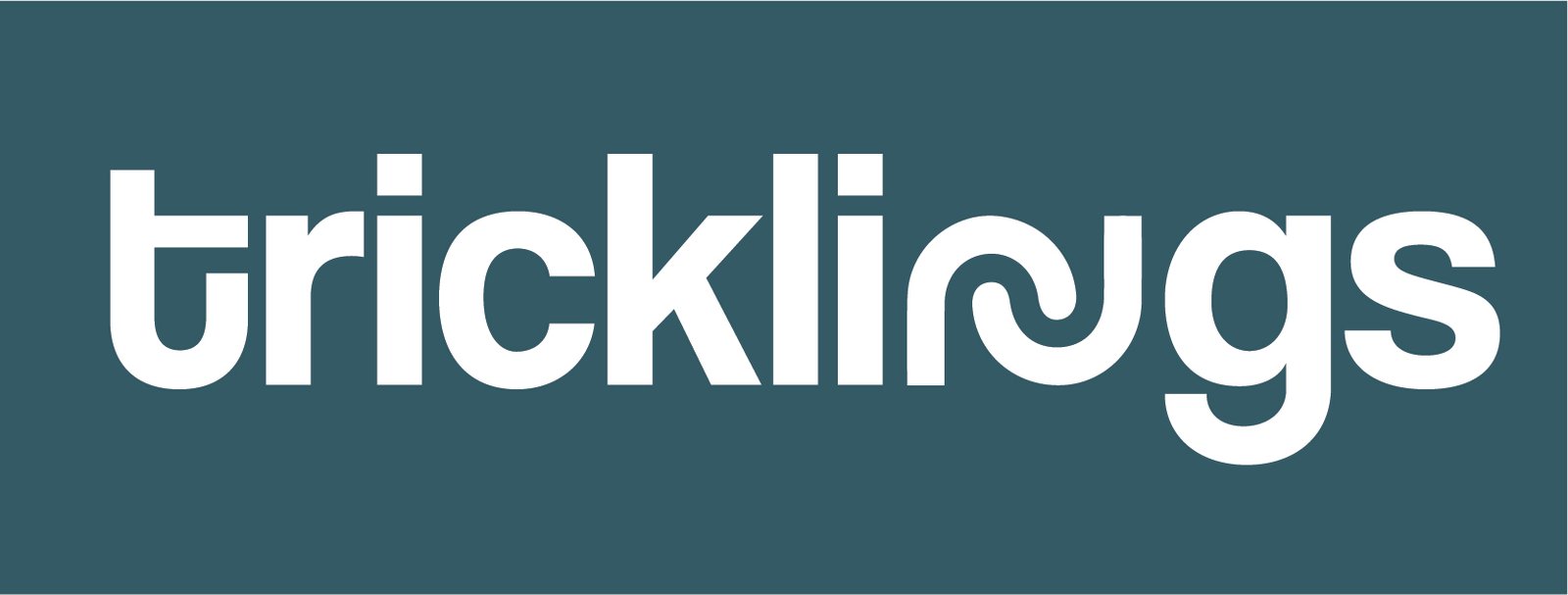





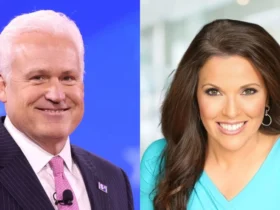





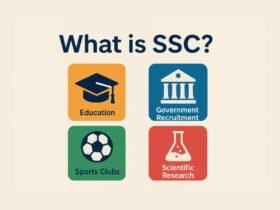




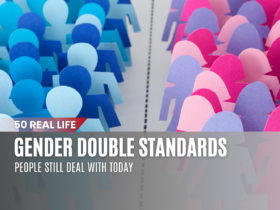


Leave a Review